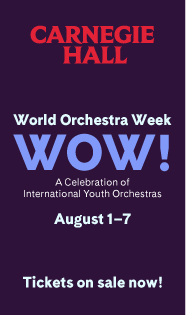Eliza Garth brings fine playing to contemporary works amid errant ensemble
Classical concerts are almost always well-planned events, especially when it’s a solo recital; the artist chooses and prepares music they find meaningful and want to play for the public.
Pianist Eliza Garth’s Thursday night performance at Merkin Concert Hall was an unusual exception to the standard. It wasn’t a question of preparation—Garth is a fine musician and her playing was impressive—but of a disjunct at times between artist and composer, and even between the pianist and other musicians.
Call it a solo recital with occasional accompaniment. Presented by the League of Composers-ISCM, Garth played music by Judith Weir, opening with The Art of Touching the Keyboard and closing with the New York premiere of Weir’s Piano Concerto, for which she was joined by a small string ensemble conducted by James Baker. She also played two of Mario Davidovsky’s works, his wonderful and enduring Synchronisms No. 6 and the Chacona for string trio (with violinist Curtis Macomber and cellist Chris Finckel), and the New York premiere of Nomi Epstein’s for Eliza and the world premiere of Sheree Clement’s Touch.
Weir is an inventive, witty composer, and, as she told it in the program notes, the title of her opener was the literal translation of François Couperin’s treatise, L’art de toucher le clavecin. The concept of this she turned into something of a musical drama, starting with a tentative approach to the keyboard and ending with the same material played with confidence. A great idea in theory that didn’t quite work in practice Thursday, essentially because Garth is too fine a pianist to convincingly play nervously or hesitantly. This was clear from the opening gestures, which sounded off in an odd way—with the sensation that Garth was biding her time until she could really let her hands do the talking.
All evening, there was an ease to her playing and nothing ever sounded complicated. That ease meant Weir’s piece started with polish and had nowhere to go except to structure the notes. There was intellectual interest but, too often, little drama.
But further meetings between Garth’s musicianship and the composers were satisfying. Epstein’s piece is for a lightly prepared piano, which Garth set up on stage, placing a few small objects taken from a plastic bag into the piano. The altered sound lay in only a small segment of the keyboard. This was effective, as the music was about building up sonorities in the piano, then letting them decay. Here the key was Garth’s patience and calmness, listening along with the audience as sustained tones melded with each other. The preparation was something of an interlude before a haunting coda of repeated rising and falling scales that ended without resolution. The playing had ideal pace.
Davidovsky was awarded the Pulitzer for Synchronisms No. 6. It comes from a time when acoustic instruments playing with tape was still a new thing, and although the warbling and squawking electronic timbres are dated, the intelligence and curiosity of the music are ageless. Garth’s playing was exceptional, coordinated with the tape with such naturalness that the tape itself sounded live. She had to coordinate everything she did with the audio, but played with such command that her timing and phrasing sounded free, even a little playful. Her dynamics were superb.
In a sense, Garth was at her most impressive in Clement’s Teeth, which opened the second half, because this is not only a theatrical piece but one that has the performer working heavily with the inside of the piano while also singing and speaking. Meant to express the composer’s feelings of isolation at the start of the pandemic in 2020, it was a dreamlike stream of chaotic and gnarly thoughts and responses. With audio of ambulance sirens, the emphasis was on sensory events, not so much on music.
This was a kind of abstract impressionism, personal memories and experiences turned into a set piece. Garth performed this, again, with such seeming ease that it did allow the work to come through, but one’s response to this kind of thing is necessarily a matter of personal resonance and connection, and Teeth did not land with everyone.
From the very start, the Chacona sounded tense, the string players concentrating their way through the measures, as if it had not been properly prepared. String intonation went in and out, as if the players were concentrating so much on other things they had to let some details go. There were moments when the playing started to flow, and those were satisfying, but the about two-thirds of the way through, the performance fell apart, and the playing stopped. They had a brief discussion on stage, picked up where they left off to the end, but this was a loss for the score.
The strings in the Piano Concerto were also a weak link, playing with a real lack of confidence that Weir had called for in a faux way in her opening work. But the concerto is a different story, a bright, but not light, witty take on the form. The piano plays music that seems to come out of the musical theater tradition, rewritten with a sly, modernist sense of playing with structure and form; one had the image of Michael Nyman appearing on the Muppet Show. Garth’s skill and energy were at the fore, even as she seemed conscious of fitting into the ensemble. This is a terrific piece one would like to hear more often, especially played by such a fine pianist.

